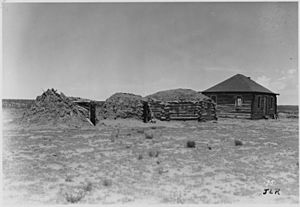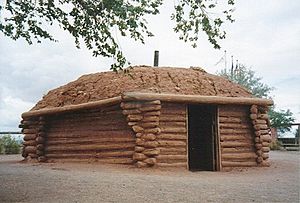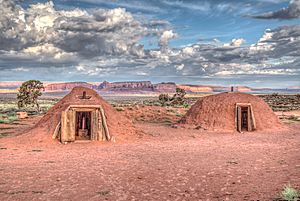Hogan facts for kids
| Look up hogan in Wiktionary, the free dictionary. |
A hogan is the traditional home of the Navajo people. It's a special type of house that has been used for a very long time. Hogans can be round, cone-shaped, or even multi-sided. They are often built with wood or stone walls, packed with earth. The door of a hogan always faces east. This is to welcome the rising sun, which is believed to bring good fortune and wealth.
Navajo people also built other traditional structures. These include summer shelters, underground homes, and sweat houses. While some older hogans are still used as homes today, many are now kept for important ceremonies.
Hogans are also known for being very energy efficient. The packed earth walls help keep the home cool in summer and warm in winter. This natural insulation is a smart way to control temperature. In summer, water sprinkled on the dirt floor also helped keep things cool.
Modern Hogan Homes
Bringing Back the Hogan Home
For many years, building new hogans as family homes became less common. This was partly because government housing programs often preferred different building styles. These styles didn't always fit the traditional hogan design or the cultural needs of the Navajo community.
However, this started to change in the late 1990s. People began looking for ways to bring the hogan back. A big step happened in 2001. The Navajo Nation teamed up with Northern Arizona University and the US Forest Service. They also worked with other groups.
This partnership started building log hogans. They used wood from Northern Arizona forests. This wood was being removed to help prevent big wildfires. By using this wood, they helped both the environment and the community.
Hogan Revival Benefits
This project has helped bring back an ancient tradition. It keeps the sacred space of the hogan mostly the same. But it also adds modern features like bathrooms and kitchens. This means families can live in them comfortably today.
The hogan revival project has many benefits. It helps keep Navajo culture alive. It also creates new jobs for people. Navajo teenagers can even get summer school experience by helping to build these homes. This project shows how old traditions can be made new again.




